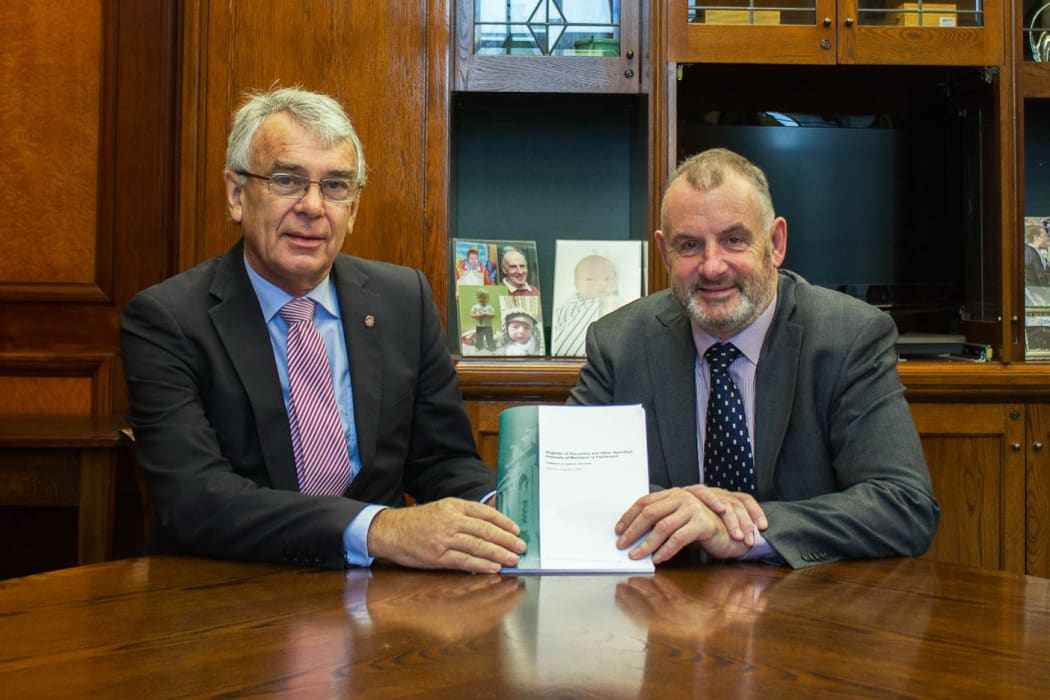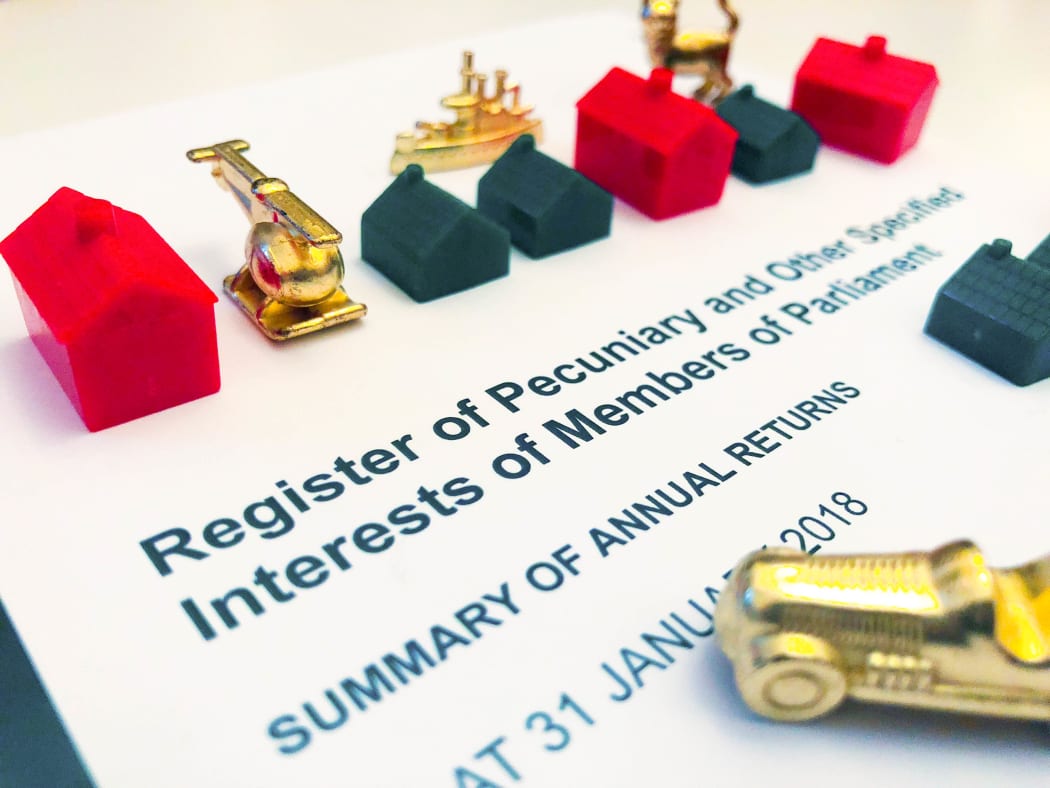Ever wondered what the country’s politicians own and earn? You can, and not as a leaked expose, but a self-revelation.
Every January MPs are obliged to deliver a report on what they own, what they earn outside Parliament, whom they owe, or owes them, and what financial interests they have.
This year’s report is now public and the 57 pages of MPs' details are available for your inspection. The document is intended as a one-stop declaration of potential conflicts of interest; a list of the things that MPs might otherwise be obliged to declare when they debate a topic that might affect their own financial situation.

The Registrar of Pecuniary Interests Sir Maarten Wevers (left), and the Speaker of the House of Representatives Trevor Mallard (right) with the new edition of the Register. Photo: Supplied / Office of the Clerk
The man responsible for collecting the information and making it public is Sir Maarten Wevers, who holds the post of Registrar of Pecuniary and Other Specified Interests of Members of Parliament.
It’s a fantastic job title and refers to the register he compiles. The list is quite specific about what MPs need to reveal (hence the ‘specified’). You can see that list of categories (with explanations) at the bottom of this article.
For a discussion of the role of Registrar and its purpose you can listen to the audio article linked to this page; but, as the idea of the register is to have a publicly available indication of the interests of MPs, a quick boil-down of a few categories might be helpful.
Here are a few details gleaned from the Register.
Property:
-
113 of the 120 MPs own (or co-own) houses (100% of National MPs, 93% or Labour, 89% of NZ First and 75% of the Greens own a residence). This tends to correlate with age.
- Between them all I counted 234 separately listed residential properties. On average National MPs own 2.3 residential properties, NZ First 1.89, Labour 1.76, and Greens 0.75.
- 32 MPs are residential landlords (18 from National, 12 from Labour, 2 from NZ First).
- Those landlords own 59 residential rentals between them.
- 12 MPs own 32 commercial properties (11 from National, 1 from NZ First).
- 15 MPs own 21 farms (13 from National, one each from Labour and NZ First), while 15 MPs own other land or sections.
- 8 MPs share interests in commonly held Maori land (6 from Labour, one each from National and NZ First).

Photo: VNP / Daniela Maoate-Cox
Gifts
- A lot of MPs receive tickets to sporting events (mostly rugby or tennis), and some to cultural events (the ballet, WOW, WOMAD). A surprising number ended up with tickets to an Adele concert, but not all from the same benefactor.
- Very few receive gifts that are not hospitality, although Chris Finlayson received a couple he charmingly struggled to describe. “An alcohol drinking flask in the form of what seems to be a sheep or a goat (quite difficult to identify the species) made of a form of dark or green-coloured material, possibly bronze or iron.”
Outside Work and Pay
- 12 MPs declared pay received for outside work or activities - mostly for directorships or things left over work from previous lives for recent MPs. Interestingly, one MP received royalties for authorship.
- One listed his work as a celebrity dancer. You can probably guess that one yourselves.
About the Categories
The 14 specified interest categories are pretty wide, but not all inclusive. MPs are not required to declare:
- What is owned or earned by their families or partners (although MPs are specifically not allowed to hide financial interests by such means).
- Any specific values (though some categories only apply over a given value).
- The financial interests of their companies or investment vehicles (this is a first degree list, delving deeper would be difficult).
- The financial or tax purposes of ownership, trust, or investment structures (the register’s purpose is to declare potential conflicts raised by financial interests, not to investigate the interests).
- The details of their business or tenancy arrangements, e.g. whether they (as individuals) rent properties to themselves (as MPs).
The 14 Categories
Here is the list of things that MPs have to report on (with my explanations).
-
Company directorships and controlling interests. (Company & area of business if MP is a director or has more than 5% of voting rights).
-
Interests in companies and business entities. (List in which companies the MP directly has shares, but not the value. Not shares held via managed investment investment schemes or similar).
-
Employment. (Any contracted employment not part of being an MP. Name employer & main business activities).
-
Interests in trusts. (Roles either as a trustee or a beneficiary, name trust, say which role).
-
Organisations and trusts seeking Government funding. (e.g. Some MPs have roles on charitable trusts which seek public funding).
-
Real property. (Real property is physical e.g. land or buildings. List property owned by the MP or by a trust they’re a beneficiary of. Note location and form e.g. Family Home, Henderson).
-
Superannuation schemes. (Any retirement schemes the MP has savings in).
-
Managed investment schemes. (Name of the scheme, and who runs it).
-
Debtors. (Anyone who owes the MP more than $50,000. Don’t include sum owed. Also note if the interest rate of the loan is lower than a commercial rate).
-
Creditors. (Anyone the MP owes more than $50,000. Usually a mortgage. Don’t include sum owed. Also note if the interest rate of the loan is lower than a commercial rate. Not periodic invoices).
-
Overseas travel. (Note who paid for any overseas travel or accommodation - and to where, unless it was paid for by self, family, NZ state or as part of an parliamentary trip).
-
Gifts. (Note any gifts estimated over $500 unless from family. Includes hospitality. Not donations covered by Electoral Act).
-
Discharged debts. (Any debts of over $500 paid off for the MP by someone else - other than family).
-
Payments for activities. (Note any other payments for any activities not part of the MP’s role).
The full register is available to read on the Parliament website.


